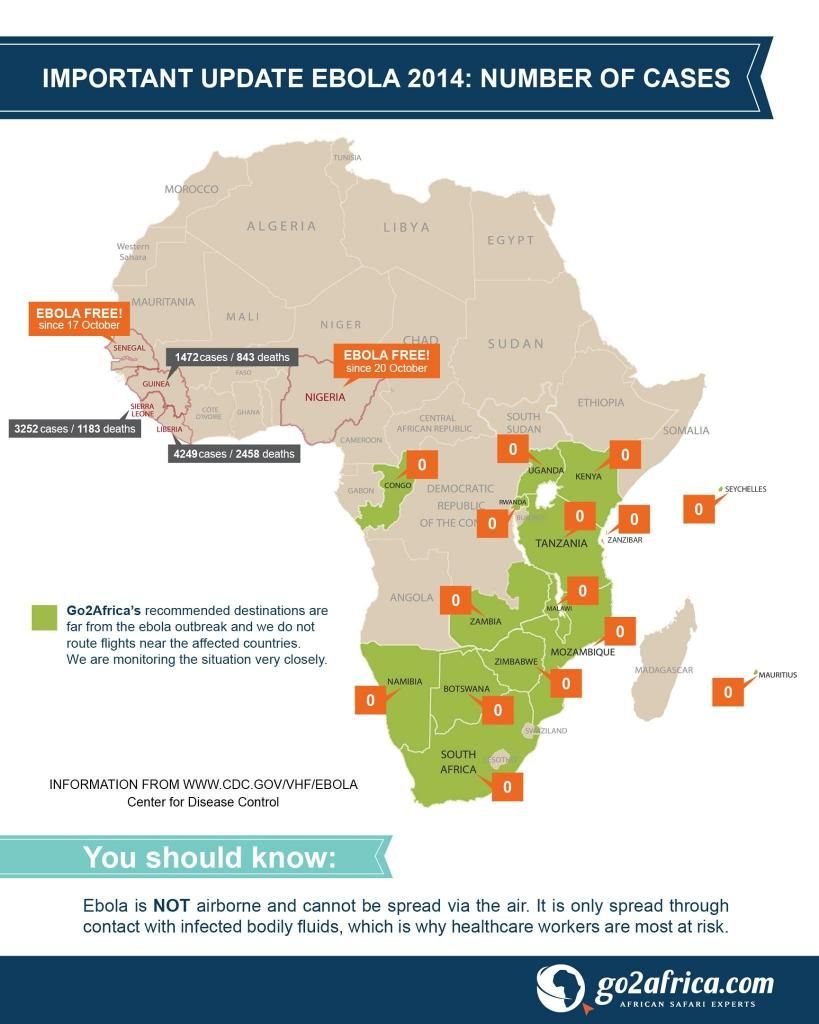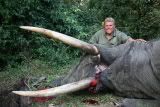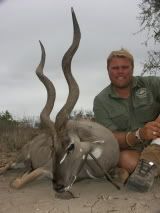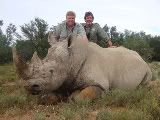

 The Accurate Reloading Forums
The Accurate Reloading Forums  THE ACCURATE RELOADING.COM FORUMS
THE ACCURATE RELOADING.COM FORUMS  Hunting
Hunting  African Big Game Hunting
African Big Game Hunting  Ebola Map for perspective
Ebola Map for perspectiveGo  | New  | Find  | Notify  | Tools  | Reply  |  |
| One of Us |
I thought this would give a little perspective as to where this is happening and where most of us are hunting. I'm not trying to start another argument on how it's transmitted, only showing the current cases. Forgive me if this has already been posted. Greg  Greg Brownlee Neal and Brownlee, LLC Quality Worldwide Big Game Hunts Since 1975 918/299-3580 greg@NealAndBrownlee.com www.NealAndBrownlee.com Instagram: @NealAndBrownleeLLC Hunt reports: Botswana 2010 Alaska 2011 Bezoar Ibex, Turkey 2012 Mid Asian Ibex, Kyrgyzstan 2014 | ||
|
| Administrator |
Thank you Greg. | |||
|
| one of us |
Thanks Greg. MARK H. YOUNG MARK'S EXCLUSIVE ADVENTURES 7094 Oakleigh Dr. Las Vegas, NV 89110 Office 702-848-1693 Cell, Whats App, Signal 307-250-1156 PREFERRED E-mail markttc@msn.com Website: myexclusiveadventures.com Skype: markhyhunter Check us out on https://www.facebook.com/pages...ures/627027353990716 | |||
|
| One of Us |
Puts some of the hysteria over Ebola into perspective. From all indications, this outbreak is starting to turn the tide. Let's hope the hysteria does as well. ___________________ Just Remember, We ALL Told You So. | |||
|
| One of Us |
Thanks for sharing Greg. The Media is doing us a great disservice . Senegal, Nigeria and Congo have all beaten Ebola. Dave Davenport Outfitters license HC22/2012EC Pro Hunters license PH74/2012EC www.leopardsvalley.co.za dave@leopardsvalley.co.za +27 42 24 61388 HUNT AFRICA WHILE YOU STILL CAN Follow us on FACEBOOK https://www.facebook.com/#!/leopardsvalley.safaris | |||
|
| One of Us |
Can someone please get Fox News to show this on their program???? "When the wind stops....start rowing. When the wind starts, get the sail up quick." | |||
|
| One of Us |
Keep in mind too that Amsterdam is closer to the affected countries than Tanzania. The media unfortunately is more interested in sensationalism/hype than actually reporting truthful news. If you have that much to fight for, then you should be fighting. The sentiment that modern day ordinary Canadians do not need firearms for protection is pleasant but unrealistic. To discourage responsible deserving Canadians from possessing firearms for lawful self-defence and other legitimate purposes is to risk sacrificing them at the altar of political correctness." - Alberta Provincial Court Judge Demetrick    | |||
|
| One of Us |
I had an educated person tell me today there is no way they would go to Africa with the Ebola issue. Mind you, we live about 200 miles from Dallas, Texas, epicenter for Ebola in the US. Can someone estimate how far it is from Zimbabwe to the Ebola area in West Africa??? That should put this in perspective!! | |||
|
| One of Us |
Note, not only the relatively low number of infections, but where they are and how far that is from the rest of the continent. Most people cannot concieve of the size of Africa. Many think Africa is a country. Also, look at the death rate. Way down from prior Ebola outbreaks. | |||
|
| One of Us |
Here is a handy little web calculator for distances Distance calculator And to answer your question Zim to Nigeria is 2393 miles capital to capital If you have that much to fight for, then you should be fighting. The sentiment that modern day ordinary Canadians do not need firearms for protection is pleasant but unrealistic. To discourage responsible deserving Canadians from possessing firearms for lawful self-defence and other legitimate purposes is to risk sacrificing them at the altar of political correctness." - Alberta Provincial Court Judge Demetrick    | |||
|
| One of Us |
It would also be helpful to point out that the claimed Ebola deaths are out of more than 150 million west Africans and that more west Africans died of the runs during this period than from Ebola, so prioritizing our worries might be helpful. We are a hysterical and irrational species. | |||
|
| One of Us |
Well, some people even think we have 57 states, so... ___________________ Just Remember, We ALL Told You So. | |||
|
| new member |
Thanks for posting Greg, great to see the real facts | |||
|
| One of Us |
Always helps to put it into perspective. | |||
|
| One of Us |
That is good information and seems to be getting better. Now we need to keep a lid on spreading to the US and other parts of the world, since we are still at risk in that regard. Our Dear Leader has not been so impressive in terms of crisis control, as opposed to spin control. Norman Solberg International lawyer back in the US after 25 years and, having met a few of the bad guys and governments here and around the world, now focusing on private trusts that protect wealth from them. NRA Life Member for 50 years, NRA Endowment Member from 2014, NRA Patron from 2016. | |||
|
| One of Us |
http://www.phasa.co.za/what-is...26-october-2014.html EBOLA INFORMATION KIT – 20 to 26 October 2014 Stay updated on developments on the disease. Dear PHASA members Despite the disease’s confinement to remote areas of West Africa, located at its closest some 4 500 kilometres away from South Africa, the 2014 Ebola outbreak has understandably created fear among travellers to Africa, with many of them cancelling their trips as a precautionary measure. We have prepared this comprehensive information pack on Ebola for you to send to your clients should they be concerned about their trip to South Africa and recommend that you also refer them to the websites of South Africa’s Department of Health (www.health.gov.za) and the Department of International Relations and Co-operation (www.dfa.gov.za) for more information and updates. While the fatality rate of the disease is considerably high, it is not air, water or food borne. Ebola can only be transmitted through direct contact between mucous membranes or broken skin and the bodily fluids of a symptomatic patient. We have every confidence in South Africa’s preparedness, should an Ebola case be positively identified within our borders, as well as in the capacity of our hospitals to quarantine and treat patients. Both Nigeria and Senegal have been declared Ebola-free and it is worth noting that it is only those countries where the health-care system is in a very poor state where Ebola is currently rampant. Additionally, we believe that South Africa’s position of screening arrivals from affected countries and limiting incoming flights from these countries are sufficient for the moment, given that these comply with the protocols and recommendations of the United Nations World Health Organisation. People should appreciate just how big Africa is, and what happens in West Africa, particularly in its rural areas, is really far removed and isolated from the rest of the continent. At the end of this information pack is a map of Africa, which will help give it some perspective by showing how many countries can fit into its borders. Yours sincerely Adri Kitshoff Chief executive STATEMENT FROM SA’S DEPARTMENT OF HEALTH – issued 8 August 2014 SOUTH AFRICA IS ON HIGH ALERT - NO NEED TO PANIC The World Health Organization has declared the Ebola outbreak an international public health emergency. This is the largest Ebola outbreak to date and will require international support to the affected countries and a coordinated response to control the outbreak and stop further spread. The risk of infection for travellers to the region would, however, be considered low and the WHO has not imposed general trade or travel restrictions either to or from Sierra Leone, Guinea, Liberia and Nigeria. Human infections result from direct contact with the body fluids and organs and blood of infected patients and there is no airborne spread. Persons with confirmed Ebola disease or identified contacts of these patients will not be allowed to travel out of the affected countries. This regulation would not apply to expatriates who become ill while working in the affected countries and who require medical evacuation. There will be exit screening at all borders in the affected countries to detect persons with febrile illness. There are no special precautions or directives for commercial flights, passengers or crew departing on flights bound for or returning to Guinea, Liberia, Sierra Leone or Nigeria. The risk of Ebola being introduced into South Africa remains low. There are a number of measures that have been put in place at South African ports of entry as well as medical facilities in South Africa to identify persons at risk with fever from the affected countries. If after visiting Ebola affected countries and you experience fever, tiredness, headache, nausea, vomiting, diarrhea, cough, immediately call your medical centre and tell them about your symptoms and travel history. There are eleven designated hospitals for handling suspected cases of Ebola in the country. Travellers in Africa are reminded of the malaria risk and the need to take preventative measures and to always consider malaria in the event of the occurrence of fever. EBOLA FACTS Sourced from the European Centre for Disease Prevention and Control www.ecdc.europa.eu What is Ebola? Ebola virus disease, or Ebola haemorrhagic fever as it was previously known, is a rare but severe disease, found in countries in Africa, which can often have a fatal outcome (for 25-90% of the infected people). The first documented outbreak of Ebola virus disease occurred in 1976 in the Democratic Republic of Congo, at the time known as Zaire, and all subsequent outbreaks have been in Africa. What are the symptoms of Ebola? In most cases, an infected person experiences sudden onset of fever, weakness, muscle and joint pains and headache, followed by progressive weakness, lack of appetite, diarrhoea (sometimes containing blood and mucus), nausea and vomiting. The initial symptoms are unspecific and are similar to other more common diseases such as the common cold or malaria. The next stage is more severe with bleeding from the nose, gums and skin, and bloody vomiting and stools. Other symptoms include skin rash, inflamed throat and difficulty swallowing. It can take between 2 and 21 days from the point of infection for a person to begin to show symptoms. How can a person get infected? A person can get infected with the Ebola virus by direct contact with infected blood, secretions, tissues, organs or other bodily fluids of dead or living infected persons. However, the risk for transmission in general is low in the initial stages of symptomatic patients. It is transmitted by droplets and not in the air, so it is highly unlikely that someone would be infected with Ebola virus disease just by coming into casual contact with someone already sick, such as sitting next to someone (and without any direct contact of bodily fluids). Most people are infected from another person but some people have been infected with it from handling dead wild animals or 'bush meat' in Africa, such as chimpanzees and bats. How contagious is it? People only become infectious once they start to have symptoms. The risk of being infected in the early phase of symptomatic patients is generally low. The risk of infection is much higher in the later stages of the disease but can be effectively addressed with the proper use of appropriate personal protective equipment. How deadly is it? The case fatality rate – the proportion of people diagnosed with the disease who die – is 25-90% dependent on the virus type. Is the virus resistant? The Ebola virus is susceptible to disinfectants and bleach and is destroyed by heating. Is there a vaccine? There is no approved vaccine at this point but research is ongoing. What is the treatment? There is no specific treatment that is approved for general use against Ebola virus disease but supportive treatment – hospital care to relieve symptoms and to prevent further complications and side effects – can be given. Where does it come from? Ebola viruses are thought to circulate in wild animals in sub-Saharan Africa. They have been found in fruit bats, chimpanzees, gorillas and duikers, and human infections have been linked to direct contact with such animals. How can an outbreak be stopped? An outbreak of Ebola virus disease can be stopped by breaking the chain of transmission. This can be done by isolating suspected and confirmed patients to prevent onward transmission. At the same time, people who have been in close contact with patients are also contacted and monitored to identify possible infections. If there is an Ebola outbreak in a country, does it mean that I shouldn’t travel there? Check with your national authorities for travel advice on whether to travel to a country affected by an Ebola outbreak and other health information, including access to healthcare for reasons other than Ebola virus disease. How can I protect myself against Ebola infection? Avoid contact with symptomatic patients and/or their bodily fluids Avoid contact with corpses and/or bodily fluids from deceased patients Avoid contact with wild animals (including monkeys, forest antelopes, rodents and bats), both alive and dead, and consumption of ‘bush meat’ Wash hands regularly, using soap or antiseptics When to seek medical attention? If you develop fever, muscle aches, weakness, headache and sore throat, you have been in a known affected area, having had contact with blood, secretions, or other bodily fluids of living infected persons, you should seek rapid medical attention also mentioning your travel history. THE SIZE OF AFRICA – A PERSPECTIVE | |||
|
| Powered by Social Strata |
| Please Wait. Your request is being processed... |
|
 The Accurate Reloading Forums
The Accurate Reloading Forums  THE ACCURATE RELOADING.COM FORUMS
THE ACCURATE RELOADING.COM FORUMS  Hunting
Hunting  African Big Game Hunting
African Big Game Hunting  Ebola Map for perspective
Ebola Map for perspective

Visit our on-line store for AR Memorabilia

